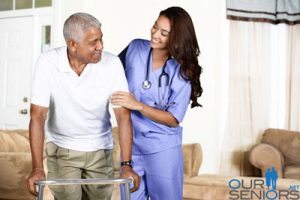 Falling, and the injury that may result, is one of the major hazards facing our seniors. This is true for seniors who live alone with no outside help, as well as those residing in senior assisted living facilities or remaining at home with help from in-home senior care. According to the National Council on Aging, falls are the number 1 cause of both fatal and non-fatal injuries to seniors. These injuries can rob a senior of their independence and lead to major expense.
Falling, and the injury that may result, is one of the major hazards facing our seniors. This is true for seniors who live alone with no outside help, as well as those residing in senior assisted living facilities or remaining at home with help from in-home senior care. According to the National Council on Aging, falls are the number 1 cause of both fatal and non-fatal injuries to seniors. These injuries can rob a senior of their independence and lead to major expense.
Because of the large number of 55+ communities in Florida, the number of residents in senior assisted living and those receiving in-home senior care, our state is especially vulnerable to this hazard. Frequent or even occasional falling is not an unavoidable fate in senior life. There are proven methods for reducing the incidence of falls in seniors; many of these programs are free and available to residents of senior assisted living facilities or to those using in-home senior care services and even no care at all.
Falls and the fear of falling have a significant impact on seniors, both economically and emotionally. A fall incident that would be minor to a younger person can result in a broken hip or other serious injury to a senior. When an older person begins to have serious concerns about falling, it is likely to limit their mobility and, therefore, their physical and social activities. The result is a general physical decline, social isolation and possibly depression. In fact, many residents of senior assisted living facilities or those making use of in-home senior care are in these circumstances because of falling.
The economic toll for seniors can be expressed in dollars and cents; the National Coalition on Aging calculates that the total cost of injuries to seniors due to falls will reach $67.7 billion by 2020. It is a major expense to both patients and to the health care system, and the sad thing is that most falls could have been prevented. You only need to look for warning signs!
Poor vision is an obvious warning; if the senior is vision-impaired, the chance of tripping over an everyday obstacle is magnified. Some medications or even over-the-counter drugs may cause dizziness, leading to a fall. A senior’s sense of balance can become impaired, often through inactivity and lack of exercise, making falls more likely. Chronic medical conditions like stroke, arthritis or diabetes result in loss of function in the limbs, making falls more likely and many senior homes have not been modified with devices like hand rails or shower grips that make falling less likely.
The Council on Aging recommends some simple steps that could prevent many or most falls:
- Talk to your senior loved one about their health status. Have they already experienced a fall? Are they taking medication that is likely to cause dizziness? Have they talked to their physician about possible falls?
- Ask about their eye checkups. Are they current? If they use tint-changing lenses, these glasses may remain darkened when a person comes inside from bright sunlight. This can lead to accidents and falls. Wearing bifocals can make stair climbing harder, so be aware.
- Take notice if a senior holds on to furniture, walls or another person when walking or if they have difficulty standing up after sitting. These may be signs that they need the services of a physical therapist.
- Consider the use of a cane or walker. Many seniors resist this idea, but be persistent about using these walking aids.
- Think about new or upgraded safety measures for the residence. Better lighting, hand rails on both sides of stairways, ‘grab bars’ in the shower or bathtub and by the toilet are all relatively inexpensive ways to avoid a fall that may prove catastrophic.
Professionals who provide senior home care and those working in senior assisted living facilities should be watchful for fall hazards and for signs that those in their care might be fall prone. If you are looking for a senior assisted living facility or choosing an in-home senior care provider, be sure that they have proper facilities and adequately trained personnel.
A core function of OurSeniors.net, its professional staff and its senior living magazine, OurSeniors.net Magazine, is to be familiar with the senior home care providers and the senior assisted living facilities in Florida. Please call on us for assistance in finding a quality senior assisted living facility or a first class in-home senior care provider. OurSeniors.net will always seek to fulfill its core mission to serve the needs of seniors and make every transition to senior life as safe, secure and satisfying as possible. You can contact Ourseniors.net by clicking on the link. View a preview version of our senior living magazine, by clicking OurSeniors.net Magazine. You may contact our office and professional staff by phoning OurSeniors.net at 866-333-2657 or by using our Contact Page.
